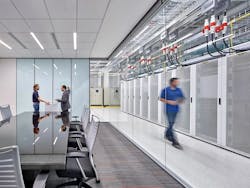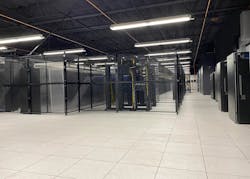New $725M Financing for DataBank, Plus Las Vegas Interconnection Hub Pickup, Highlights DigitalBridge Data Center Investment
As frequently noted in this space these days, in the age of AI, the pace and scope of data center financing has become breakneck, and shows little sign of slowing down.
Earlier this week on our data center investment beat, we covered Brookfield Infrastructure Partners' newfound Centersquare brand, built on the merging of Evoque Data Centers with the acquired assets of Cyxtera.
Today, we look into the recent doings of a key component of competitive digital infrastructure asset manager DigitalBridge's portfolio of data center companies - i.e, DataBank - along with an instructive, recent co-announcement from its DigitalBridge sibling, Vantage Data Centers.
DataBank's New $725 Million Credit Facility
This week DataBank announced its establishment of a $725 million financing facility to support its next phase of data center expansion.
The new, flexible financing vehicle will allow the provider of enterprise-class edge colocation, interconnection, and managed cloud services to accelerate construction projects to meet surging demand for data center capacity driven by AI workloads, it said in a press release.
The new capital comes in the form of a $725 million credit facility with which to finance DataBank's ongoing and future data center construction projects.
The financing will fund the company's ongoing expansion projects in existing markets, including its data center campuses in New York, Denver, Minneapolis, Salt Lake City, and Dallas.
"The financing provides an attractively priced source of capital that is a long-term and scalable solution to meet accelerating demand for capacity within DataBank’s footprint," noted the company's statement.
The move represents DataBank’s second green financing, following closely on the heels of the the company's February 2024 Green Bond.
DataBank noted that, in order to qualify as a green loan, the facilities being financed will meet specific sustainability criteria for water conservation, carbon emissions reduction, and a low Power Usage Effectiveness (PUE).
The aforementioned projects, as well as others underway across DataBank’s portfolio, are all contributing to the company's goal of being carbon neutral by 2030.
“New and emerging AI applications have created unprecedented demand for DataBank’s data center capacity,” pointed out Kevin Ooley, DataBank’s President and Chief Financial Officer.
Ooley continued, “This new credit facility will allow us to meet that demand more quickly by shortening financing and construction timelines across all our campuses - but especially as we ramp up activity in the new ones we’ve announced in Northern Virginia and Atlanta.”
Campus Ambitions
DataBank's campus ambitions are well known. In November 2023, the company announced its acquisition of an 85-acre campus in Culpeper, Virginia that will support up to 192 megawatts (MW) and 1.4 million gross square feet of data center space.
Additionally, one month prior, the company announced its acquisition of a 95-acre campus in Atlanta capable of supporting another 120 MW and 1 million gross square feet of data center space.
Once fully deployed, the facilities on these two campuses would nearly double the current 375 MW and 2.7 million square feet across DataBank’s current portfolio of 65 facilities in over 27 metro areas, the company stated.
In support of these campuses, the new credit facility is supported by a group of 14 prominent digital infrastructure banks. TD Securities was the Administrative Agent, Joint Lead Arranger, and Joint Bookrunner in the transaction.
Citizens Bank, CoBank, Deustche Bank, First Citizens, and Société Générale were Joint Lead Arrangers and Joint Bookrunners for the transaction, with JP Morgan, Nomura Securities, RBC Capital Markets and Regions Bank joining as Joint Lead Arrangers.
Bank of America and Goldman Sachs were Co-Documentation Agents. Cadence Bank and Preferred Bank supported the transaction as well. Jones Day was DataBank’s legal advisor for the transaction.
DataBank Shores Up Nevada Footprint
News of the new credit facility came on the heels of a report earlier this month that DataBank had completed a lease buy-back for the LAS1 Data Center in Las Vegas.
This data center purchase aligns with DataBank’s strategy of owning the largest edge data center footprint in U.S., the company said in a statement.
On April 1, DataBank announced that it completed its acquisition of 7185 Pollock Drive in Las Vegas, NV, the location of the LAS1 Data Center.
Previously owned by the Thomas & Mack Development Group, LAS1 was recently expanded; the data center now features 36,800 raised square feet, with 3.55 MW of critical IT load power.
Importantly, DataBank notes that LAS1 is an interconnection hub, providing access to five onsite carriers and fiber built into the facility with redundant entry paths.
The purchase of the LAS1 facility enables DataBank to further its stated strategy "of owning and controlling the real estate beneath its data centers and controlling its future."
DataBank’s LAS1 data center will provide much needed capacity to meet the market's need for high-performance computing, enterprise and edge applications, and hyperscale workloads.
The data center operater noted that the Las Vegas market – with low sales taxes, no state income tax, and a fast-growing entertainment and technology sector – continues to experience high demand for mission-critical IT infrastructure.
“DataBank’s investment in this property aligns with our strategy of owning the largest edge data center footprint in the U.S.,” stated Raul K. Martynek, DataBank’s CEO.
Martynek added, “By completing this purchase, DataBank is responding to Las Vegas’ need for colocation, connectivity, and cloud services. We are solidifying our status as a prime location for mission-critical workloads serving the Las Vegas area.”
Las Vegas/Reno Data Center Market Thumbnail
In it North America Data Center Report | H2 2023, JLL noted that opportunities for data center developments are gaining traction in the Las Vegas/Reno data centers market. To wit:
- In terms of supply, the report discerned a total inventory 3,716,140 SF for the market with 330.8 MW of power.
- The report saw 123,000 SF of vacancy at 13.6 MW, with 918,040 SF of supply under construction at 188 MW.
- Planned construction in the Las Vegas/Reno data center market is 750,000 SF at 108 MW, according to JLL.
As stated by the report, "The demand for the Nevada submarkets of Vegas and Reno is now starting to pick up more steam for providers, as power availability and relatively low land costs remain a constant for this market."
The commercial real estate services firm added, "The Las Vegas market has expanded outward from the central areas as the utility expands outward."
JLL further noted that Nevada data center market alternative Reno has become increasing popular for up-and-coming campus developers (such as Tract), "as costs to build from both a land and a power perspective are lower than that of Las Vegas and has a strong network connectivity to Silicon Valley."
Vantage Data Centers Moves Into Taiwan's Hyperscale Greenfield
For its part, reflecting the asset manager's global reach, in March, DigitalBridge infrastructure stablemate Vantage Data Centers announced its securing of a US$64 million loan from top Taiwanese banks for the completion of that country's first greenfield hyperscale data center project financing transaction.
The approximately NT$2 billion loan from CTBC Bank and Cathay United Bank will fund the development of the company’s first data center in Taipei, dubbed TPE11. The deal marks the first hyperscale data center financing transaction for a data center operator in Taiwan.
The transaction is Vantage’s first in Taiwan with the two banks. The move marks the operator’s third transaction with CTBC globally and its first with Cathay United, both among the top Taiwanese banks.
The TPE11 Taiwan campus, which was first announced last December, is the eighth developing or operational campus in Vantage Data Centers' APAC portfolio.
Currently under development and expected to open mid-2024, TPE11 will deliver 16 MW of IT capacity across a 215,000 SF (20,000 sq. m.) facility.
Once completed, the campus will serve hyperscalers, cloud providers and large enterprises, as the region becomes a major digital infrastructure hub.
“Vantage is proud to lead the way in marking the first financing of a greenfield data center project in Taiwan,” said Joel Cheah, Vantage’s CFO in the Asia-Pacific region. “We appreciate CTBC Bank’s continued confidence in Vantage’s data center platform and are pleased to have the Cathay United Bank team join us in this innovative financial milestone in the next phase of Taiwan’s growth as a regional data center market.”
Versatility and Scope of DigitalBridge
The recent data center announcements from DataBank and Vantage demonstrate the versatility and scope of DigitalBridge, which, as previously noted by this publication, has used its relationships with the investment community to raise expansion capital, while building experienced operating teams that can deliver new projects across diverse geographies and operating scales.
Both data center companies mentioned in this article, with DataBank representing the edge and colocation sector, and Vantage devoted to hyperscale campus builds, have benefited from DigitalBridge’s ability to line up secured notes to fund future growth.
At his keynote address for the recent Metro Connect USA event as put on this February by Capacity Media, DigitalBridge CEO Marc Ganzi told attendees:
“We have a once in lifetime opportunity to build AI infrastructure – much like public cloud was 10 years ago. Every 10 years, we get an opportunity. Making sound investment decisions is the most important thing to do as a sector."
Ganzi added that he believes that the industry on a 10-year journey to truly enable the infrastructure to support Generative AI. He told the Metro Connect audience that the industry must focus on re-architecting networks to enable those applications.
DigitalBridge Group, Inc. (NYSE: DBRG) today announced it will release its First Quarter 2024 financial results after the market closes on Tuesday, April 30, 2024.
About the Author
Matt Vincent
A B2B technology journalist and editor with more than two decades of experience, Matt Vincent is Editor in Chief of Data Center Frontier.





